If you’re like many, the idea of trying ginseng tea might leave you with doubts about its flavor.
Will it be a pleasant surprise or a taste bud rollercoaster?
I know craving a hint of sweetness in your tea is normal.
But the fear of ginseng tea being dry or excessively bitter might be holding you back from that satisfying, slightly sweet experience.
So what does ginseng tea taste like?
Ginseng tea tastes earthy, bitter, and slightly sweet. The primary taste you’ll notice is bitterness, but it’s often balanced with a slightly sweet and earthy undertone. The bitterness can be strong, and some describe it as a bit sharp.
The sweet and earthy elements help to mellow the overall flavor.
It may also have a slight spicy or peppery note, but this varies among different ginseng teas.
Want to learn about the taste of different types of ginseng teas?
Don’t forget to check the next sections!
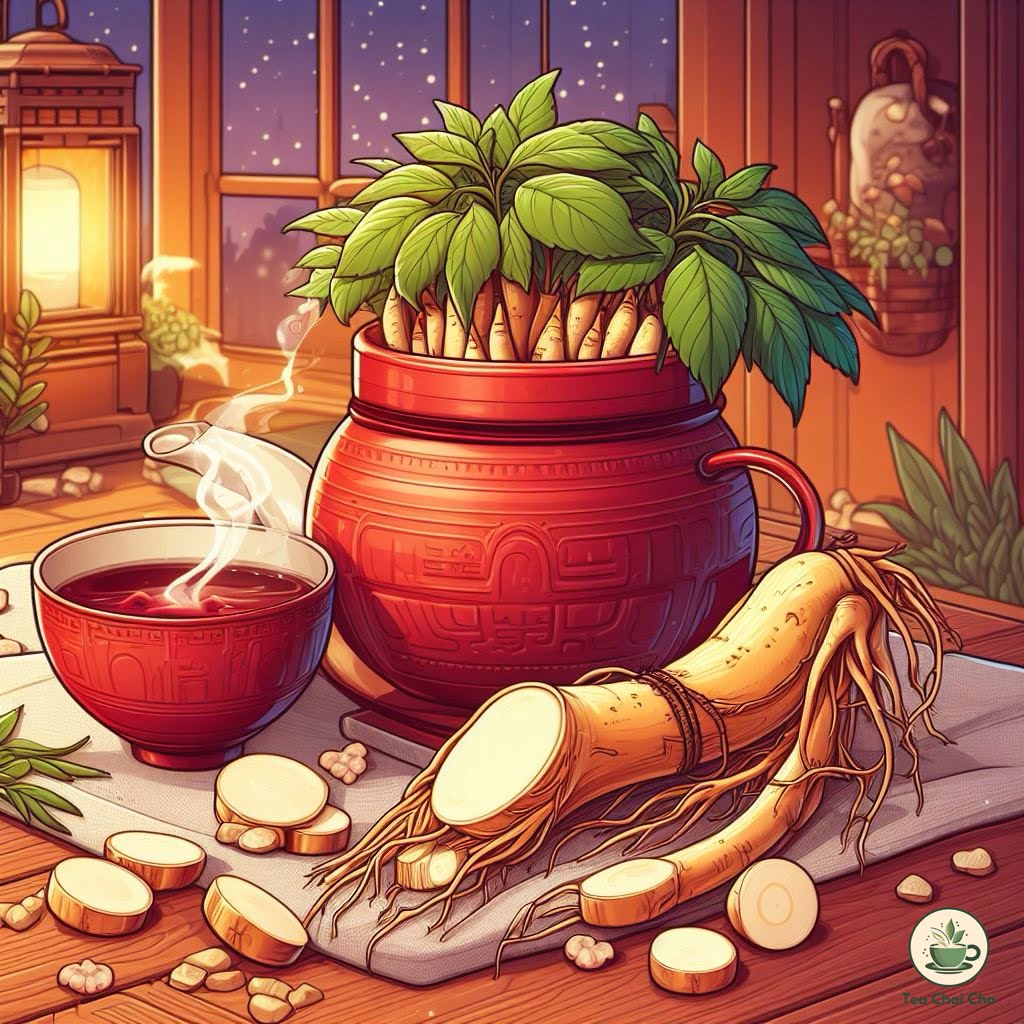
What Does Red Ginseng Tea Taste Like?
Red ginseng tea will taste like a combination of bitterness with a touch of sweetness.
The bitterness is there, but it’s not too strong.
It’s more like a mild herbal bitterness.
At the same time, you’ll notice a subtle honey-like sweetness in the background.
The tea also has a noticeable earthy flavor.
It’s somewhat akin to the taste of herbs and roots with woody undertones, giving it a unique twist.
This earthy note adds to the overall complexity of the tea’s taste, setting it apart from other herbal teas.
When you take a whiff of red ginseng tea, you’ll pick up a distinctive, rich aroma that might remind you of freshly turned soil.
It’s a strong aroma, but not overpowering, and it complements the tea’s flavor.
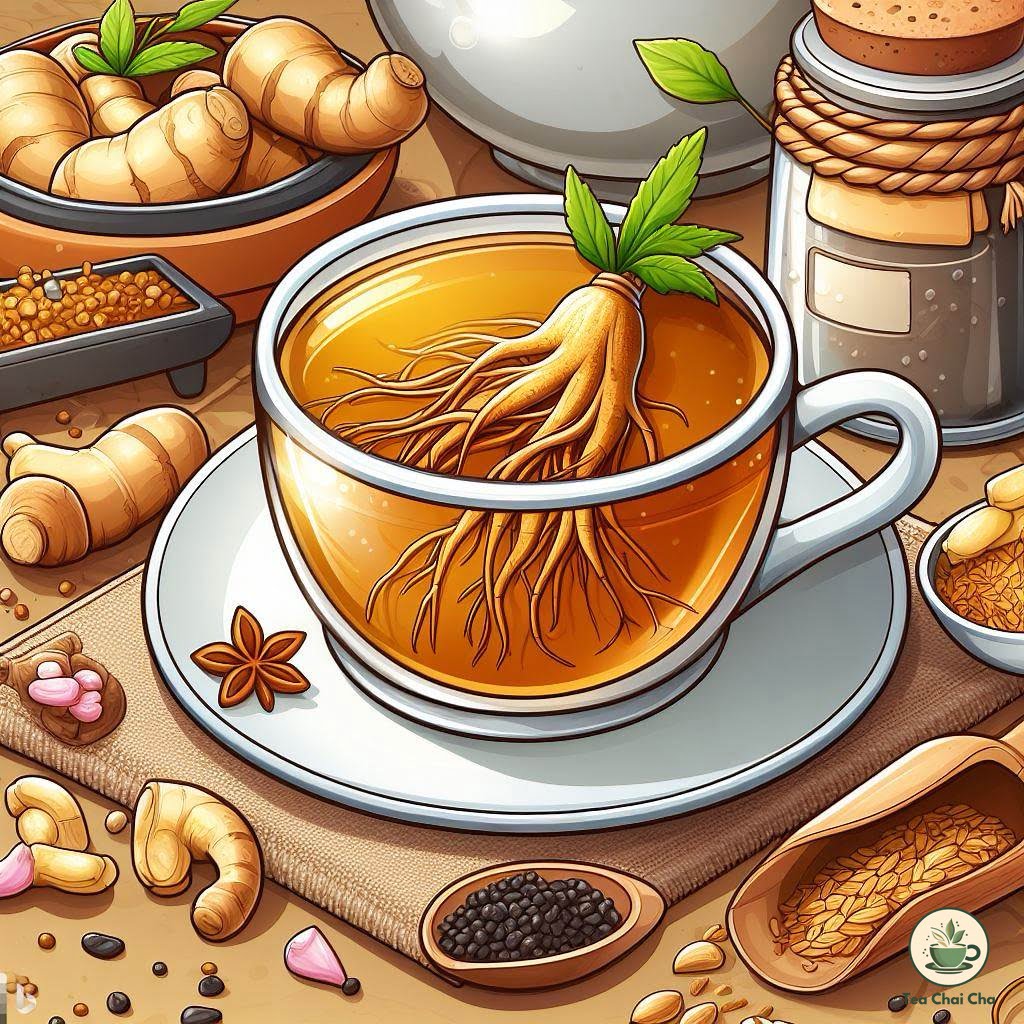
What Does Korean Ginseng Tea Taste Like?
Korean ginseng tea has a taste that’s distinct from other ginseng varieties.
It’s known for being mild and slightly sweet.
Unlike the more bitter taste of some ginseng teas, the bitterness in Korean ginseng tea is gentle and in the background.
The mild bitterness might be reminiscent of a soft herbal note rather than an overpowering taste.
The sweetness in Korean ginseng tea is a notable feature.
It offers a subtle, honey-like sweetness that balances well with the mild bitterness.
This sweetness is more pronounced in Korean ginseng tea compared to other ginseng types, contributing to its unique flavor.
In contrast to the earthy undertones found in some ginseng teas, Korean ginseng tea tends to have a clean and refreshing taste.
It doesn’t carry the same woody or earthy notes.
This sets it apart from other ginseng varieties, making it a choice for those who prefer a lighter and sweeter ginseng experience.
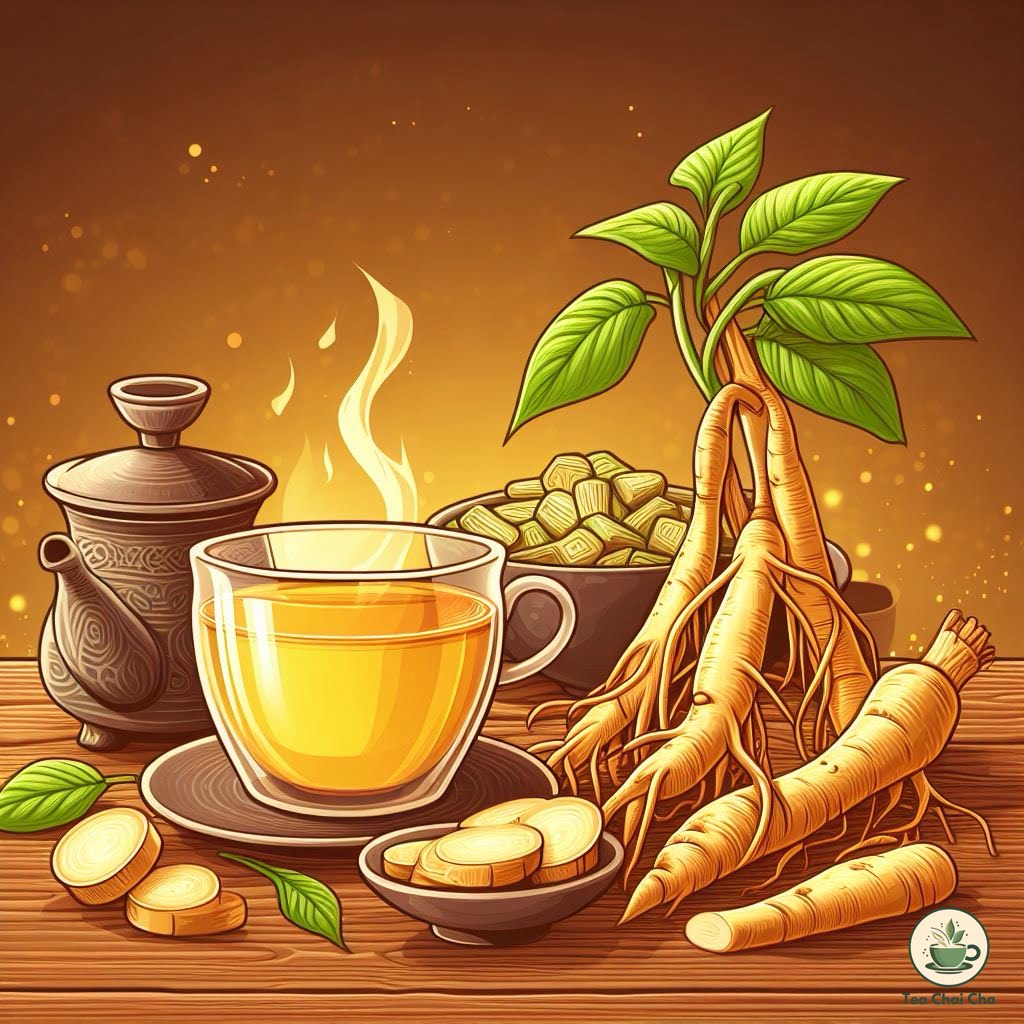
What Does Ginseng Green Tea Taste Like?
Ginseng green tea taste is a blend of earthy and vegetal notes.
The ginseng imparts a subtle bitterness, similar to a mildly bitter herbal taste.
This bitterness is complemented by the freshness of the green tea, giving it a refreshing and slightly grassy undertone.
The combination creates a balanced taste that’s neither too bitter nor too astringent.
You’ll also detect a subtle sweetness in ginseng green tea, which can vary depending on the specific blend or brand.
Some may have a more pronounced sweetness, while others maintain a more understated sweetness, providing a pleasant contrast to the slight bitterness.
Why Does Ginseng Tea Taste So?
Ginseng tea has a unique taste primarily because of the key ingredient – ginseng.
Its distinct flavor can be described as bitter and slightly earthy.
The taste of ginseng tea largely depends on the type of ginseng used and how it’s prepared.
Korean ginseng tends to be sweeter than American ginseng, which has a more bitter taste.
The bitterness in ginseng tea is a result of more than a 100 ginsenosides, bioactive compounds found in ginseng.
These compounds are responsible for the bitter and slightly astringent flavor.
The earthy and spicy notes in ginseng tea can be attributed to the terpenoids and volatile oils present in ginseng.
Earthiness in this tea is reminiscent of the forest floor, while the spiciness adds a warm, almost peppery quality to the taste.
The sweetness in ginseng tea, on the other hand, is attributed to polysaccharides and saponins.
The soil and climate where ginseng is grown also influence its flavor.
The way ginseng tea is prepared also affects its taste.
Fresh ginseng roots are milder in flavor, while dried and processed roots tend to be more intense in taste.
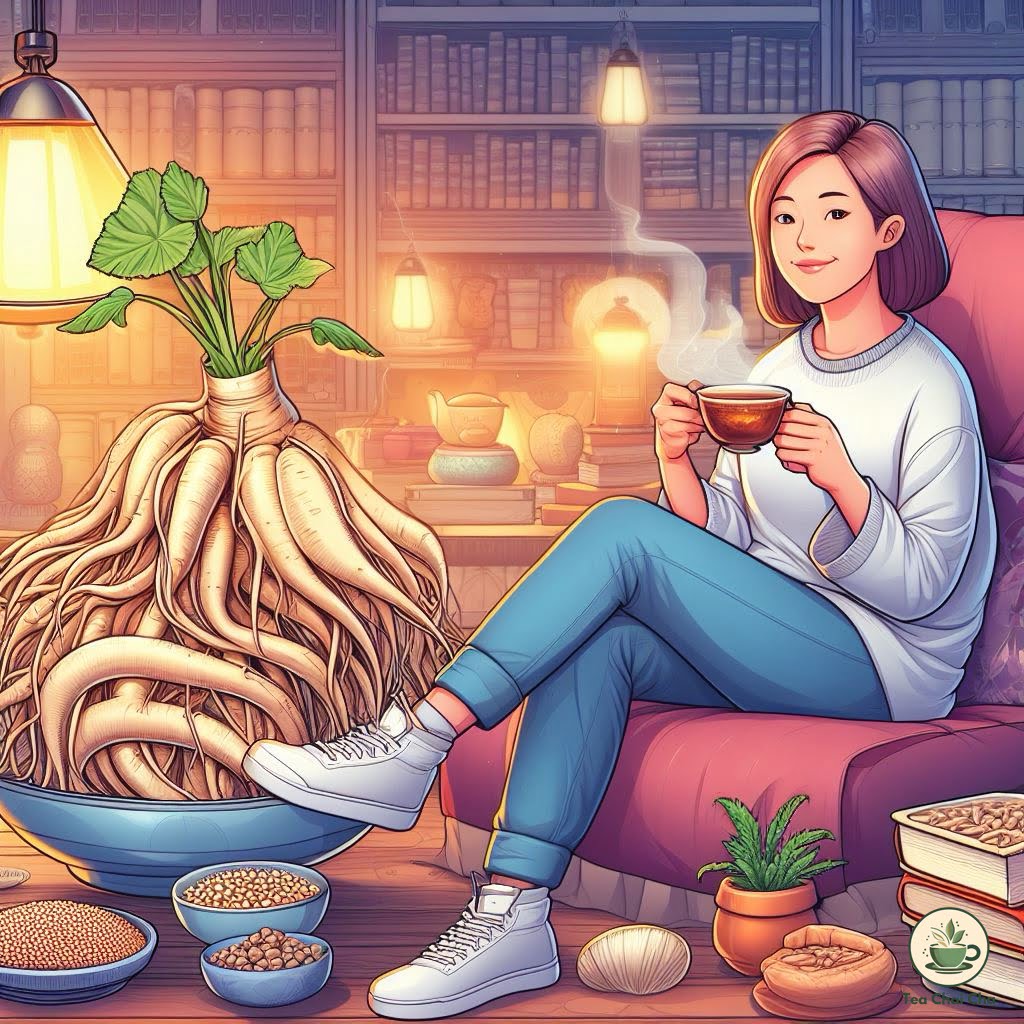
6 Different Tastes of Ginseng Tea
When you sip on ginseng tea, you’ll experience a range of tasting notes that contribute to its unique flavor profile.
1. Earthy Flavor
Ginseng tea often carries an earthy note, which stems from the ginsenosides present in the ginseng root.
These compounds give the tea a grounding taste, reminiscent of the soil where ginseng grows.
It’s a result of the natural chemical makeup of the herb.
2. Bitter Undertones
You might detect bitterness in your ginseng tea, and this can be attributed to the presence of ginsenosides as well.
These compounds lend the tea its bitter edge.
The bitterness is a characteristic that has been associated with the potential health benefits of ginseng.
3. Sweet Aftertaste
Ginseng tea can surprise you with a subtle sweetness in the aftertaste.
This sweetness emerges as a pleasant contrast to the initial earthy and bitter notes.
It arises from the interaction of ginsenosides and polysaccharides with your taste buds, creating a unique balance in the tea.
4. Spicy and Peppery Hints
Some ginseng teas offer a hint of spiciness and peppery undertones.
This comes from the ginseng volatile oils found in ginseng.
The spicy notes add depth and complexity to the tea’s flavor profile, making it a dynamic beverage.
5. Refreshing Astringency
A mild astringency in ginseng tea is due to the presence of tannins.
The astringency adds a refreshing quality to the tea, which can be enjoyable and invigorating.
It’s a deliberate element in the tea’s composition.
6. Herbal and Grassy Notes
Ginseng tea often carries herbal and grassy notes, thanks to the botanical nature of ginseng.
These notes enhance the overall flavor profile and contribute to the tea’s natural and wholesome character.
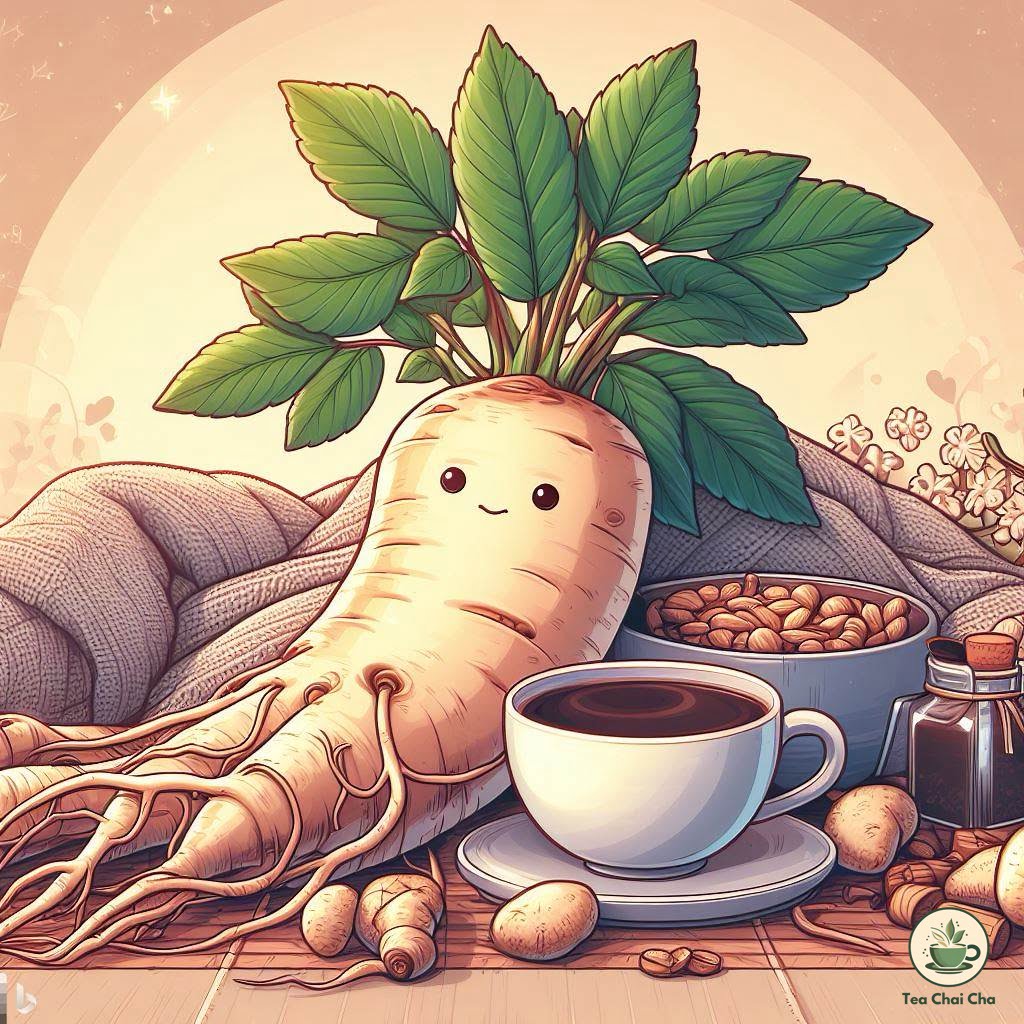
What Do Different Ginseng Teas Taste Like?
Ginseng comes in two main types: American ginseng, and Asian ginseng.
Other types of ginsengs emerge from the difference in processing.
Here’s how ginseng teas from these types taste like:
1. American Ginseng Tea
When you try American ginseng tea, you’ll notice it has a gentle, slightly bitter flavor that comes with a touch of sweetness.
It’s a good choice if you prefer teas with a subtle earthy taste along with hints of grass and a mild spiciness.
You’ll find that the bitterness is not overwhelming, making it a smooth and enjoyable option for those new to ginseng teas.
Its natural aroma is soothing and refreshing.
2. Asian Ginseng Tea
As for Asian ginseng tea, also known as Panax ginseng, it offers a strong and robust taste.
You’ll experience a bitter and earthy flavor with a noticeable heat or spiciness.
The bitterness is quite pronounced, giving it a potent and invigorating quality.
If you’re looking for the energizing effects of ginseng, this tea is a favorite choice.
3. Black Ginseng Tea
Choosing black ginseng tea will introduce you to a complex and rich flavor.
It combines a sweet, earthy taste with a caramel-like sweetness that balances the natural bitterness of ginseng.
Compared to white and red ginseng teas, it’s known for its smooth and harmonious taste.
4. White Ginseng Tea
For a milder and slightly sweet flavor, go for white ginseng tea.
It retains the natural sweetness of ginseng and has a subtle and barely noticeable bitterness, giving you a gentle and refreshing taste.
White ginseng tea is perfect if you prefer a delicate and clean flavor.
5. Red Ginseng Tea
Red ginseng tea provides a bold, sweet, and slightly bitter taste.
It’s made from steamed and dried ginseng roots, which contributes to its deeper, caramel-like sweetness and a more pronounced bitterness compared to white ginseng tea.
This combination results in a robust and invigorating taste that many ginseng enthusiasts appreciate.
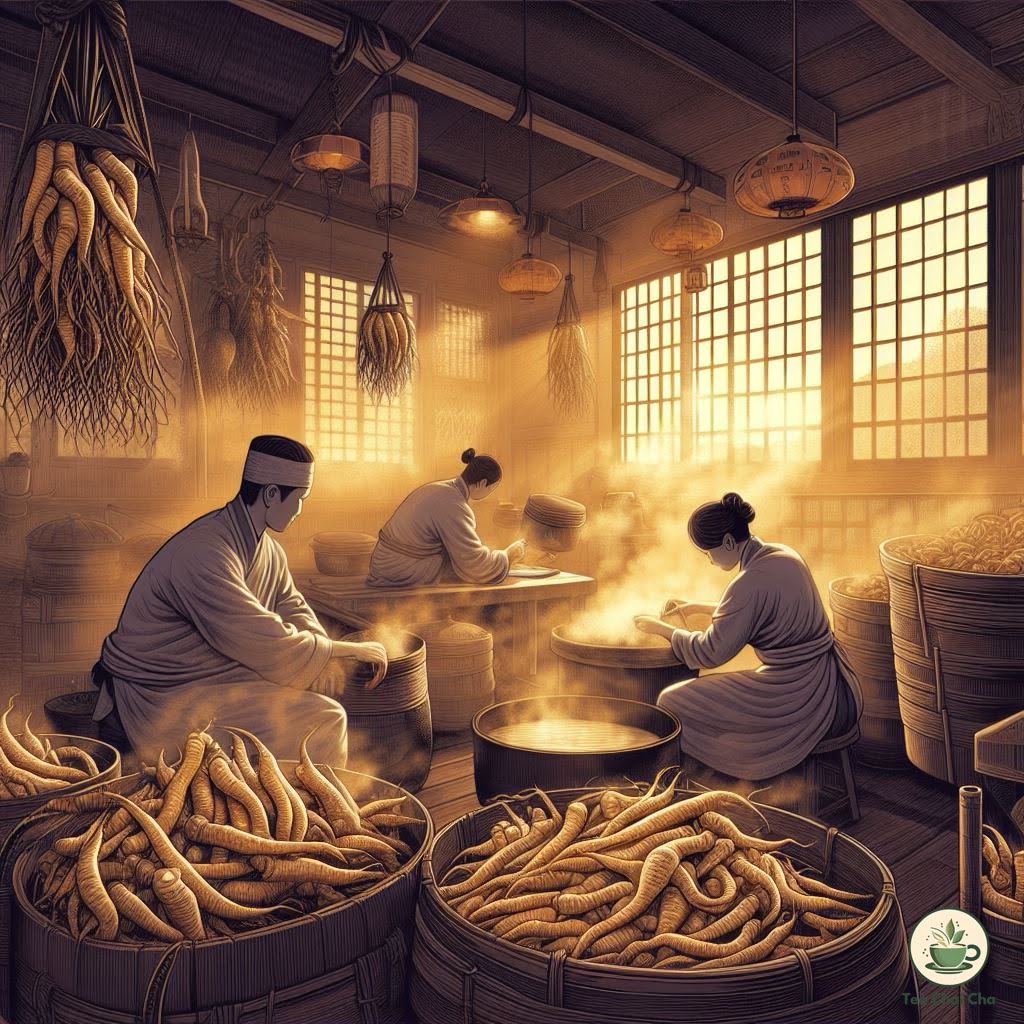
Effect of Processing on Ginseng’s Flavor
When ginseng is harvested, it goes through various processing methods that significantly influence its flavor.
Drying and steaming are two common methods used.
Drying involves air drying or sun drying the ginseng root, which tends to result in a milder flavor.
On the other hand, steaming involves exposing the ginseng to high temperatures, giving it a more robust and bitter taste.
-> White Ginseng
White ginseng is the result of air-drying ginseng roots.
This processing method helps retain the natural flavor of ginseng, which is slightly bitter and earthy.
White ginseng is milder in taste compared to other forms and retains more of the plant’s original character.
-> Red Ginseng
Red ginseng, on the other hand, is made through a steaming and drying process.
This significantly alters the flavor profile.
The steaming process breaks down some of the bitter compounds, resulting in a sweeter and more robust taste.
Red ginseng has a unique combination of sweetness and spiciness in its flavor.
-> Black Ginseng
Black ginseng is created by repeatedly steaming and drying ginseng roots.
This extended processing intensifies the flavor.
Black ginseng has a deeper, more concentrated taste, with hints of caramel and a stronger spiciness compared to red ginseng.
-> Fermented Ginseng
Fermented ginseng is yet another variety that emerges through processing.
The flavor of fermented ginseng is distinct, with a complex profile.
The fermentation process introduces sour and umami notes, making it less bitter than white ginseng but more multifaceted.
-> Wild Ginseng
Wild ginseng is harvested in its natural state, with minimal processing.
Its flavor is often considered the most potent and unaltered, with a strong, earthy bitterness.
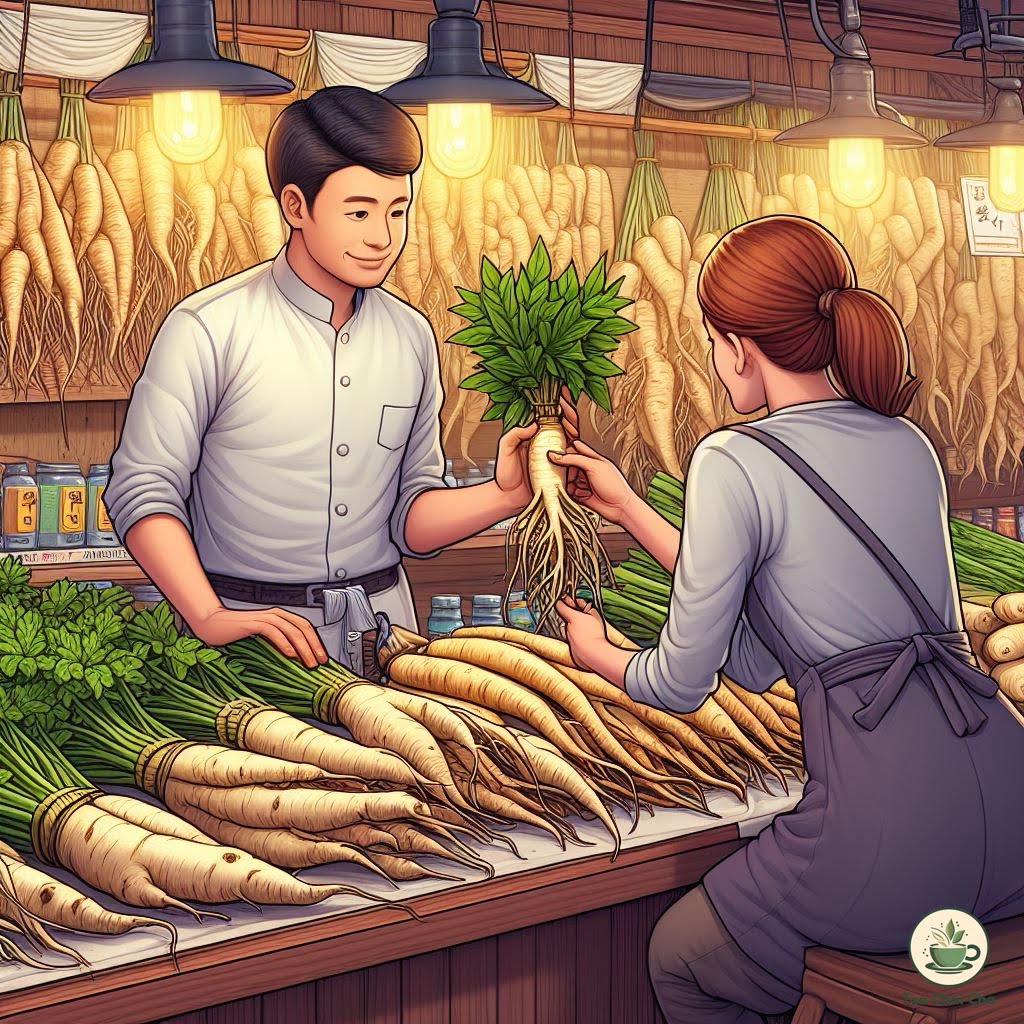
How to Buy the Best Tasting Ginseng for Tea
Want to buy ginseng for tea but not sure what to seek?
Although there are pre-made ginseng tea blends, buying high-quality ginseng will surely result in the best tasting tea.
Follow these tips to buy the best ginseng and brew this potent and unique brew.
1. Selecting Ginseng Roots
When choosing the best tasting ginseng for tea, start with the selection of ginseng roots.
Look for roots that are plump and firm, with a smooth texture.
Avoid roots that appear wrinkled or have soft spots, as these may not have the desired flavor.
Opt for ginseng roots that are larger in size, as they tend to have a more pronounced taste.
2. Age Matters
Consider the age of the ginseng root.
Older ginseng roots, which are typically around 5 to 7 years old, often have a richer and more intense flavor compared to younger roots.
The age of the ginseng is a key factor in determining its taste.
So choose roots that match your preference for a stronger or milder flavor.
3. Wild vs. Cultivated Ginseng
Decide between wild and cultivated ginseng.
Wild ginseng is often considered to have a more complex and robust taste compared to cultivated ginseng.
However, it can be harder to find and more expensive.
Cultivated ginseng is more readily available and can offer a milder, consistent flavor.
Your choice here will depend on your taste preferences and budget.
4. Region and Terroir
Consider the ginseng’s region of origin, as the terroir can influence its taste.
Ginseng from different regions may have unique flavor profiles.
Korean ginseng, for example, is known for its sweet and slightly bitter taste, while American ginseng tends to have a more bitter and earthy flavor.
Explore ginseng from various regions to find the taste that suits you best.
5. Processing and Preparation
Pay attention to the processing and preparation of ginseng roots.
Ginseng can be prepared in various forms, such as fresh, dried, or as an extract.
Each form may offer a slightly different taste.
Dried ginseng roots are commonly used for tea and have a concentrated flavor.
Fresh ginseng has a milder taste.
Ginseng extracts are known for their convenience but may lack the depth of flavor found in whole roots.
6. Smell and Appearance
Trust your senses when picking ginseng for tea.
A good-quality ginseng root should have a pleasant, earthy aroma.
Additionally, its appearance should be free from mold or discoloration.
Avoid ginseng that has an unpleasant or musty smell, as this can indicate poor quality.
7. Check the Ginsenoside Content
Ginsenosides are natural compounds responsible for ginseng’s health benefits and flavor.
Look for ginseng products with a higher ginsenoside content.
This indicates better taste and potential health benefits.
Check the label for this information.
What Flavors Pair Well with Ginseng Tea
Ginseng tea, known for its earthy and slightly bitter flavor, can be a delightful complement to various dishes.
Here are some tips on pairing Ginseng Tea with different foods.
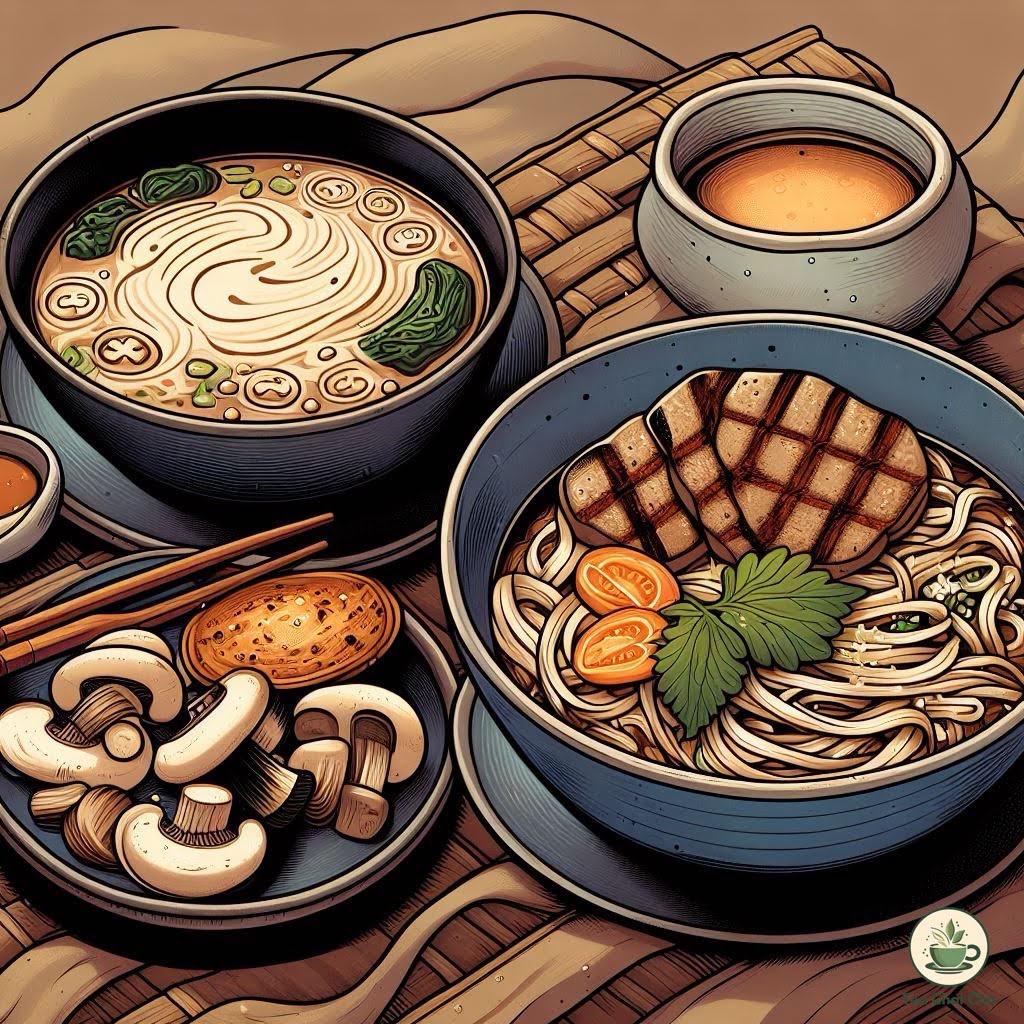
1. Savory and Umami Flavors
Savory dishes and umami-rich foods work harmoniously with Ginseng Tea.
Think along the lines of miso soup, grilled mushrooms, or a bowl of ramen.
The savory and earthy notes in these dishes balance the bitterness of the tea, creating a satisfying combination.

2. Citrus and Fruity Notes
Citrusy and fruity flavors can brighten up Ginseng Tea.
Try pairing it with dishes that have hints of citrus, like lemon-roasted chicken or orange-glazed salmon.
These flavors contrast with the tea’s earthiness, providing a refreshing taste.
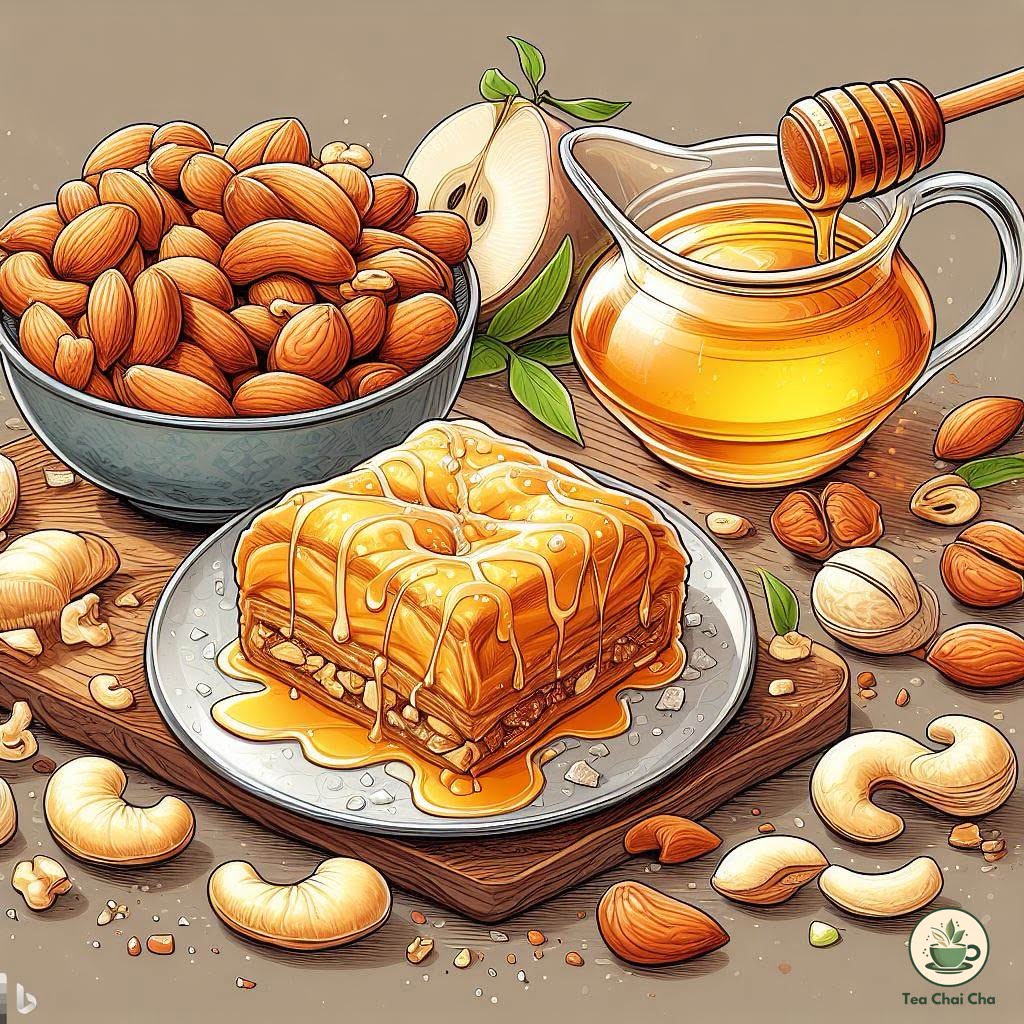
3. Nuts and Sweet Treats
Nuts and sweets can be a delightful accompaniment to Ginseng Tea.
Almonds, cashews, or a piece of honey-drizzled baklava can complement the tea’s unique taste.
The sweetness of the treats can mellow out the tea’s bitterness.
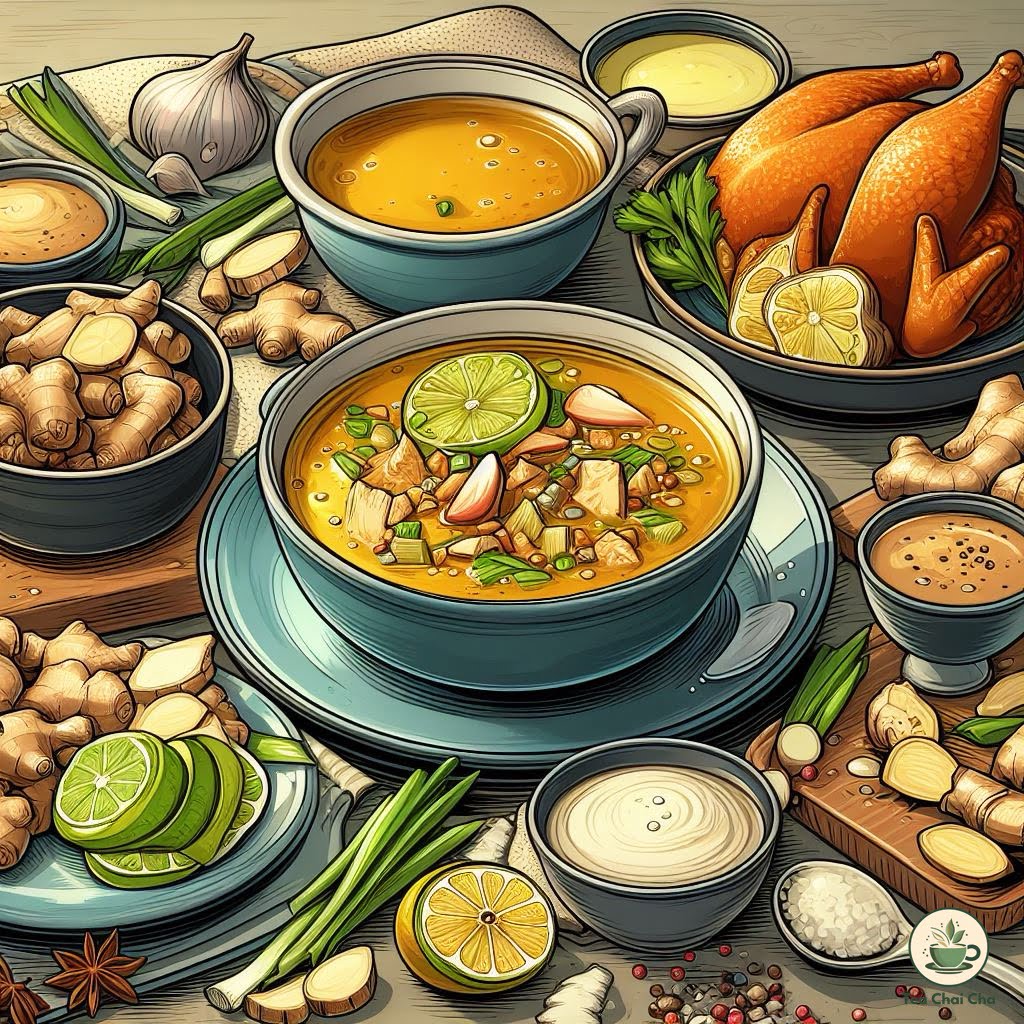
4. Spices and Herbs
Spices and herbs can elevate the experience of Ginseng Tea.
Consider dishes seasoned with ginger, cinnamon, or mint.
It can pair well with ginger-infused chicken soup.
These aromatic spices and herbs can add depth to the tea’s flavor profile, making it even more enjoyable.
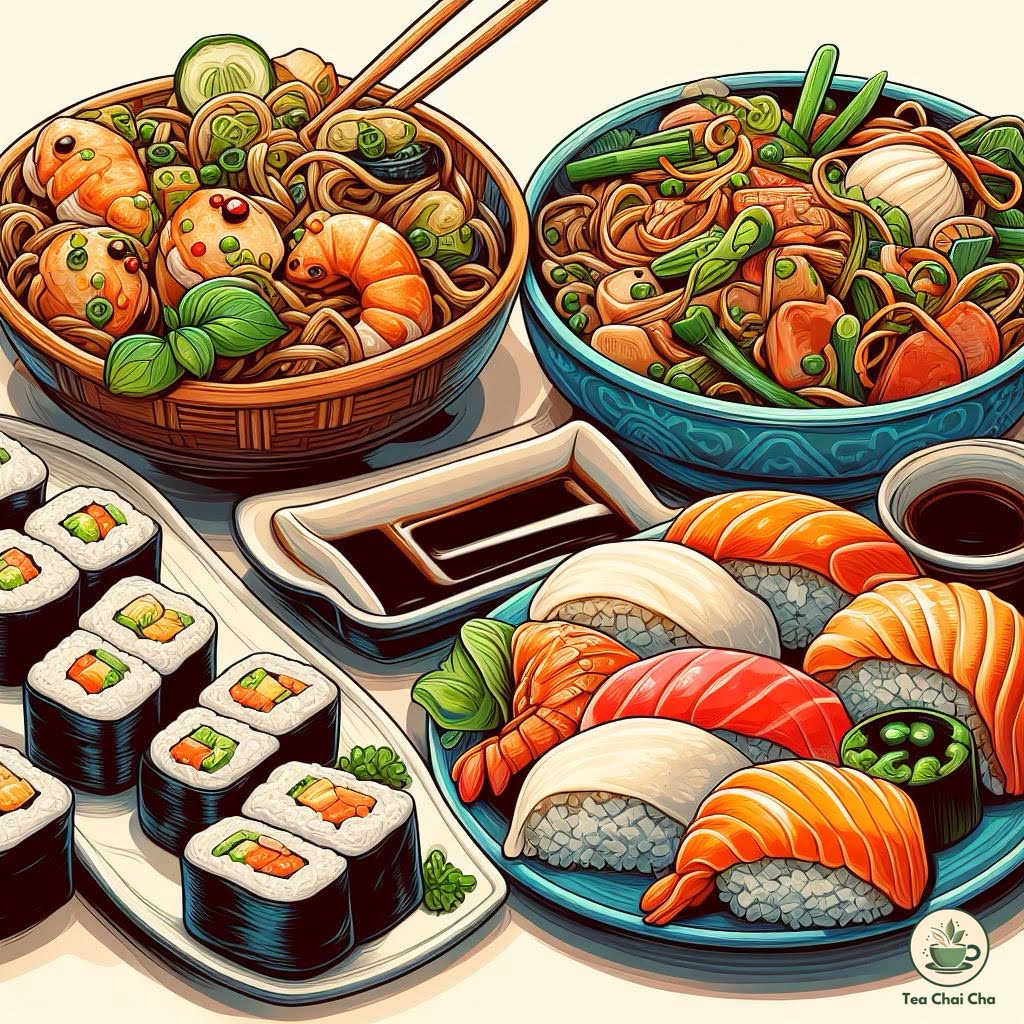
5. Asian Cuisine
Ginseng Tea has its roots in Asian culture, so it pairs exceptionally well with various Asian dishes.
Sushi, stir-fry, or dumplings, for instance, can be perfect companions for your Ginseng Tea.
Their flavors align with the tea’s natural character.

6. Neutral Snacks
For a simple and easy pairing, you can enjoy Ginseng Tea with neutral snacks like plain rice cakes, shortbread cookies, or unsalted crackers.
These snacks won’t overpower the tea’s flavor and can be a light accompaniment.
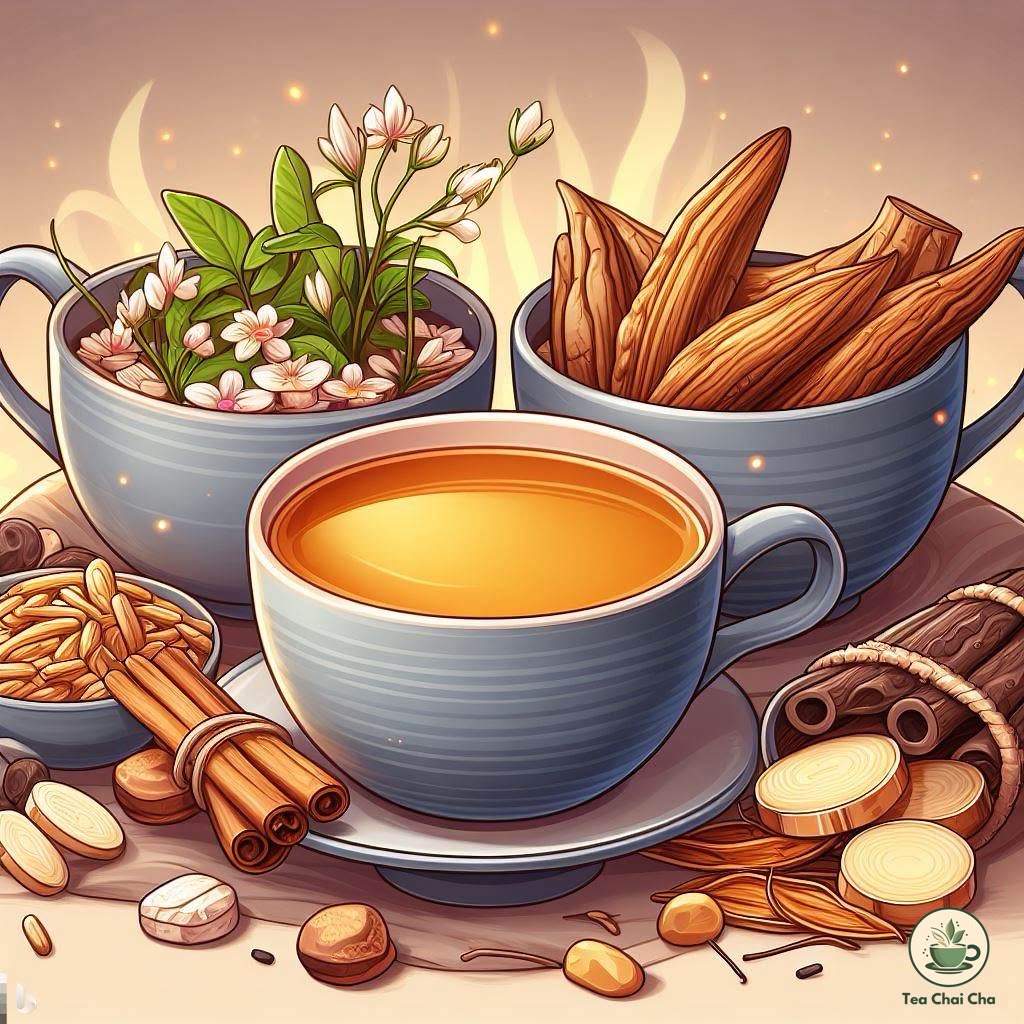
7 Teas With Ginseng-Like Taste
If you enjoy the taste of Ginseng tea and want to explore teas with a similar flavor, here are some options tailored to your preference:
1. Ashwagandha Tea for a Calming Experience
You might find Ashwagandha tea appealing.
Its earthy and slightly bitter taste shares a resemblance with Ginseng.
This tea is known for its ability to reduce stress and promote your overall well-being, making it a great choice for those looking to unwind.
2. Licorice Root Tea to Soothe Your Senses
For a sweet and woody flavor reminiscent of Ginseng, consider Licorice root tea.
It can provide relief for digestive issues and sore throats.
Just remember to consume it in moderation due to its potential impact on blood pressure.
3. Jiaogulan Tea for an Energy Boost
If you’re seeking a sweet and earthy taste akin to Ginseng, Jiaogulan, often referred to as “Southern Ginseng,” might be your cup of tea.
It is believed to promote longevity and offer an energy lift, ideal for those wanting to stay active.
4. Maca Root Tea for Enhanced Stamina
Maca root tea features a nutty and earthy flavor reminiscent of Ginseng.
It’s a great choice for those looking to boost their stamina and energy levels.
Give it a try if you’re seeking a Ginseng-like pick-me-up.
5. Siberian Eleuthero Tea for Adaptogenic Support
Siberian Eleuthero, also known as Siberian Ginseng, has a flavor profile quite close to Ginseng.
If you’re dealing with stress and fatigue, this tea’s adaptogenic properties could be your solution.
6. Astragalus Tea for Immune Support
Astragalus tea offers a mild, slightly sweet taste with earthy undertones, much like Ginseng.
If you’re interested in enhancing your immune system and overall vitality, this tea is worth exploring.
7. Rhodiola Rosea Tea for Mental Clarity
Rhodiola Rosea tea provides a slightly bitter and earthy flavor that shares some similarities with Ginseng.
It’s known for reducing fatigue and improving mental performance.
This makes it an excellent choice if you’re seeking increased focus and energy.
Related Guides on Tea Taste
🍵 Now, it’s your turn! Have you ever tried ginseng tea? If so, how would you describe its taste in just three words? Share your flavorful insights in the comments below! 🤔👇
